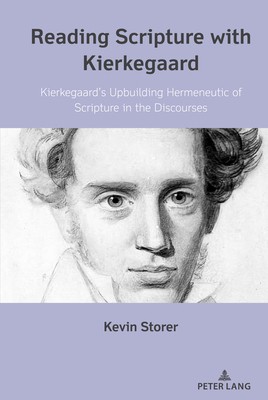
- We will send in 10–14 business days.
- Author: Kevin Storer
- Publisher: Peter Lang Inc., International Academic Publishers
- ISBN-10: 1433194864
- ISBN-13: 9781433194863
- Format: 15.2 x 22.8 x 1.6 cm, kieti viršeliai
- Language: English
- SAVE -10% with code: EXTRA
Reviews
Description
Kierkegaard's religious discourses provide extended reflections on the Biblical text, and this book explores Kierkegaard's hermeneutical project as a form of theological interpretation in the service of religious upbuilding. Comparing Kierkegaard's metaphorical view of Scriptural language with Ricoeur's theory of metaphor and second-order reference, and comparing Kierkegaard's movement from "ordinary" to "actual" reading with the Medieval movement from literal to spiritual reading of Scripture, Storer argues that Kierkegaard's project of upbuilding may be best classified as a form of tropological reading of Scripture in which appropriation opens the meaning of the text as the reader is remade into the image of God.
Through the lens of Kierkegaard's use of Scripture, the book further explores theological and rhetorical development of the discourses, focusing on Kierkegaard's move from general religious upbuilding to specifically Christian upbuilding, Kierkegaard's construction of new rhetorical strategies in the pursuit of a distinctly Christian communication, and Kierkegaard's increasing focus on Scriptural authority in the later discourses. The discourses, it is shown, exhibit a plurality of instructional and evangelistic aims, and these shape, and are shaped by, Kierkegaard's use of Scripture. Storer concludes that Scripture is used so freely and imaginatively because Kierkegaard assumes the framework of historic creedal Christianity as his foundation for upbuilding, and then utilizes Scriptural texts to enable readers to imagine, and thereby to appropriate Christian truth.
EXTRA 10 % discount with code: EXTRA
The promotion ends in 21d.15:04:03
The discount code is valid when purchasing from 10 €. Discounts do not stack.
- Author: Kevin Storer
- Publisher: Peter Lang Inc., International Academic Publishers
- ISBN-10: 1433194864
- ISBN-13: 9781433194863
- Format: 15.2 x 22.8 x 1.6 cm, kieti viršeliai
- Language: English English
Kierkegaard's religious discourses provide extended reflections on the Biblical text, and this book explores Kierkegaard's hermeneutical project as a form of theological interpretation in the service of religious upbuilding. Comparing Kierkegaard's metaphorical view of Scriptural language with Ricoeur's theory of metaphor and second-order reference, and comparing Kierkegaard's movement from "ordinary" to "actual" reading with the Medieval movement from literal to spiritual reading of Scripture, Storer argues that Kierkegaard's project of upbuilding may be best classified as a form of tropological reading of Scripture in which appropriation opens the meaning of the text as the reader is remade into the image of God.
Through the lens of Kierkegaard's use of Scripture, the book further explores theological and rhetorical development of the discourses, focusing on Kierkegaard's move from general religious upbuilding to specifically Christian upbuilding, Kierkegaard's construction of new rhetorical strategies in the pursuit of a distinctly Christian communication, and Kierkegaard's increasing focus on Scriptural authority in the later discourses. The discourses, it is shown, exhibit a plurality of instructional and evangelistic aims, and these shape, and are shaped by, Kierkegaard's use of Scripture. Storer concludes that Scripture is used so freely and imaginatively because Kierkegaard assumes the framework of historic creedal Christianity as his foundation for upbuilding, and then utilizes Scriptural texts to enable readers to imagine, and thereby to appropriate Christian truth.


Reviews